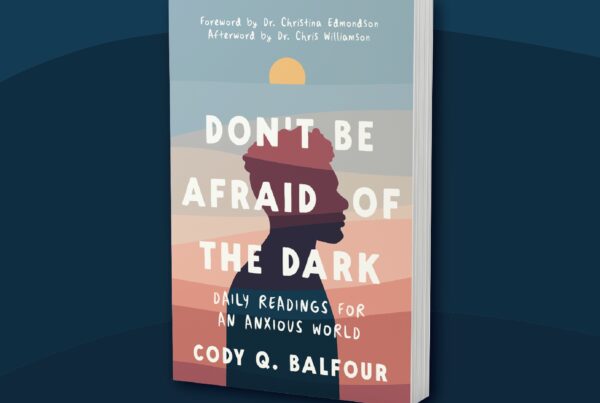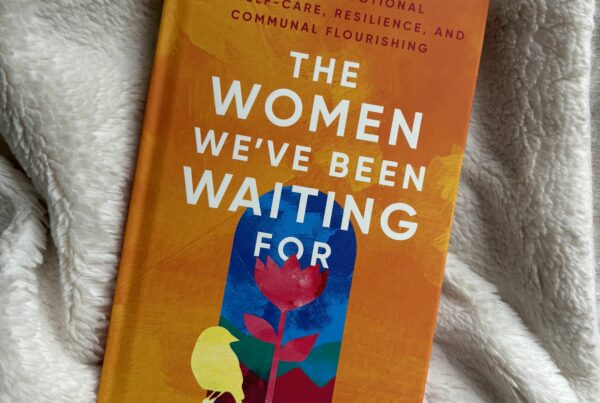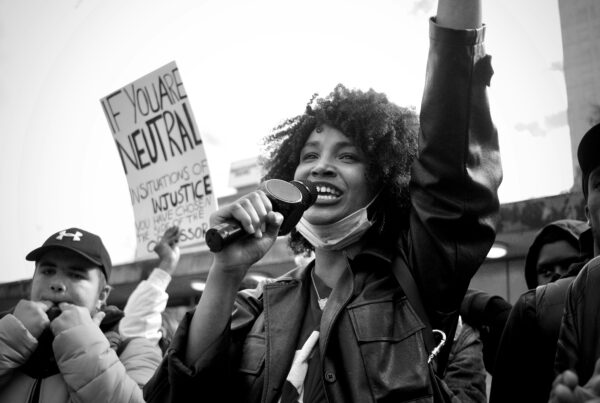According to Caroline J. Sumlin, white supremacy culture is defined as, “the systems of white supremacy have created norms, customs, values, beliefs, and standards that have taught us that whiteness is better, whiteness is success, and whiteness is value—and unless you assimilate yourself to strive for whiteness, you are forever not good enough. This is white supremacy culture.”
As part of the Chasing Justice Book Club, we are excited to feature an excerpt from Caroline J. Sumlin’s book, We’ll All Be Free.
Look Beyond the Person
To begin healing our wounds of unworthiness and take back our power, we must dig deep and see the roots of this pain for what it really is. The truth is, our culture has been feeding us the lie of unworthiness in every aspect of our lives. For most of us, this lie took root during childhood because our parents or guardians were unwittingly influenced by white supremacy and white supremacy culture. The point is not to place blame here but to see exactly how the trauma we’ve endured shares the same roots.
Parents and guardians who demanded perfection did so because they were taught it was the only way to succeed or survive in our society. Maybe their outlook was shaped by growing up in poverty or experiencing food insecurity. Or, maybe they came from a long line of Ivy League degree-earners, and they faced immense pressure to live up to the family name. Parents who tied your value to your physical appearance were taught by our society’s white-washed beauty standards that this is where value lies. Maybe they faced discrimination for how they looked when they sought job opportunities, or maybe their parents, brainwashed by fatphobic advertising, shamed their eating habits from a young age. Parents who were dismissive toward you may have been so because their parents, and society as a whole, have been dismissive toward them. Heartbreaking stories of abuse and neglect have their own roots in white supremacy, whether due to our broken capitalist systems, toxic patriarchy and misogyny, or strongholds of generational abuse.
White supremacy culture places perfectionism, objectivity, individualism, paternalism, power, and more on a pedestal and demands these traits from us in order for us to be accepted and valued. (You’ll learn more about these specific traits in chapter 3.) We are measured only by what we can produce, and we are only given the full opportunity to do so if our appearance and behavior live up to the ideals of whiteness. This is why our parents trained us to live up to those ideals, regardless of the harm caused by the ideals themselves and the way they instilled them. Unless by some slim chance your family figured out society’s true agenda, this was likely the way they were taught to approach life in order to have a fighting chance at success.
The systems and structures of our society determine who can be successful, free, and happy. Even those who can access these benefits often have to uphold toxic practices to prove that they’re deserving. This is the inescapable foundation of our society that drives everything we do. It has continued to build and grow with each new generation, adding more salt to our collective wound. If
we don’t stop it, we will continue to perpetuate it. We run the risk of passing on the very trauma we have endured to future generations without even realizing what we are doing.
For us to heal, to reclaim our worth, we must not only dig deep enough to discover the roots of our collective feelings of unworthiness but also dig deep enough to pull them all out together.
That starts with confronting your childhood and getting honest about the trauma you endured, then looking beyond the person(s) who was the deliverer of that trauma. We must see past our parents and guardians to the constant driving force of our white supremacist society that caused them to believe what they believed, to feel the way they felt, and to behave the way they behaved. If our view of self-worth is distorted, we must understand that our parents’ or guardians’ view of their self-worth was likely distorted too.
My father helped me see my mother as a human. A human with pain, sorrow, fears, and secret dreams that were never realized. A human who, just like every single one of us, deeply desires to be seen, heard, and loved unconditionally. A human who became a mother and, like every other mother, put temporary Band-Aids over life’s battle scars in order to show up the best way she knew how for her kid. Seeing my mother like this also gave me permission to see myself as a human, and I think the more I allowed myself to be a human, the more I gave my mother permission to let her humanity show too.
My mom and I call each other almost every day. We laugh together and continue growing in our shared love of music and shopping, and her grandchildren squeal with delight when she answers their FaceTime calls. With every conversation we have, more humanity is revealed and more healing occurs. Humanity is what was missing all along. And humanity is what our culture of white supremacy steals from us, taking our self-worth right along with it. When you don’t see yourself as a human being, it impedes your ability to see others as human beings too. When you don’t see yourself as worthy, it is nearly impossible to honor the worth and value of others. Even those you love with all your heart. Even your children.
I know it’s painful. You may be in a place similar to the one I was in a few years ago when I couldn’t see beyond the people who caused me pain. That’s understandable. This is a journey, and we’re
on it together.
I want to make it clear that I do not have all the answers for your healing. Instead, I am inviting you to heal right along with me. I’m opening up my journey to you, in hopes that a part of my journey will help you with your own.
Now I want you to reflect on your childhood. You can use the following journal prompts to guide you. Think specifically about your childhood and write about your experience and your parents’ story. If you can, ask your parents about their childhoods and what they were taught. See if you can draw some connections between their childhood beliefs and your own. If it’s not too painful, try to see your parents as human beings who were just doing the best they could, given their beliefs and their trauma.
Then forgive them. And forgive yourself. You did your best, and so did they. It sucks, and it’s painful, but you can heal.
You can heal.
Journal Prompts
- What are the various traumas I endured during my childhood? (The size of the trauma is irrelevant. Small, large . . .it all matters.)
- How did the behaviors and actions of those who raised me form the way I viewed myself ?
- From what I know about the adults who raised me, what do I think may have influenced their behaviors, actions, and decisions, even though those actions may have caused me
pain? - What parts of my parents’ story (or the story of the adults who raised me) have I not considered until now?
- In what ways do I think society impacted how the adults who raised me viewed the world? In what ways did those viewpoints affect how they raised me?
- Am I in a place to forgive those who hurt me in my childhood? Am I in a place to see beyond their actions and look deeply into their stories, their perspectives, and their own pain they may have been going through? If yes, how can I do so? If I’m not ready yet, what are my next steps?
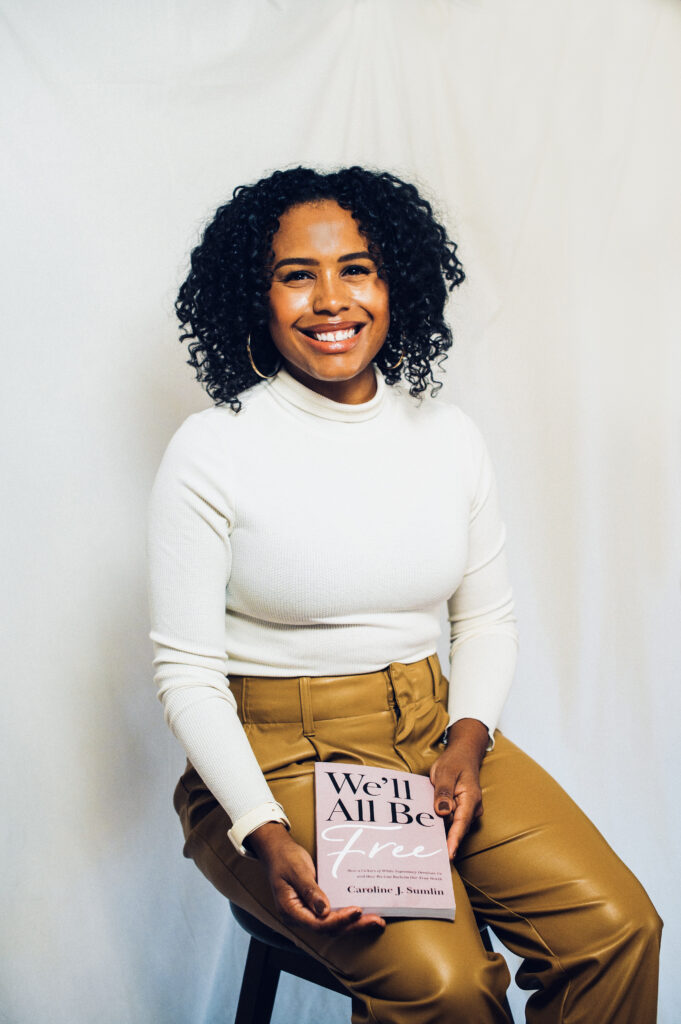
Caroline J. Sumlin is a writer, speaker, and educator with a passion for helping all people to reclaim their self-worth and humanity. A former foster child turned adoptee, Caroline brings awareness, healing, and liberation to the topics of toxic white supremacy culture, systemic injustice, mental health, faith reconstruction, and bold, purposeful living to her growing audience. She received her Bachelor of Arts degree from Howard University and resides with her husband and two daughters in Northern Virginia.
The views and opinions expressed on the Chasing Justice Blog are those of the authors and do not necessarily reflect the official policy or position of Chasing Justice. Any content provided by our bloggers or authors are of their opinion and are not intended to malign any religion, ethnic group, club, organization, company, individual or anyone or anything.




